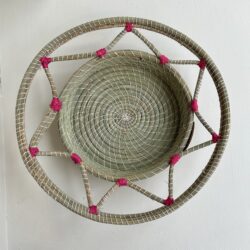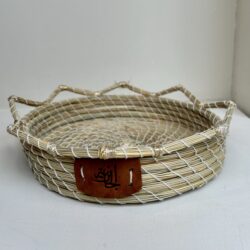Storage Baskets
Tunisian palm leaf basket, also known as a Tunisian date palm basket, is a specific type of basket made using palm leaves indigenous to Tunisia, a country in North Africa. Tunisian artisans have a long-standing tradition of weaving palm leaf baskets, and they are highly regarded for their craftsmanship and unique designs.
The process of making a Tunisian palm leaf basket involves several steps. First, mature palm leaves are collected and dried to remove moisture. Once dry, the leaves are split into thin strips using a knife or similar tool. These strips serve as the weaving material for the basket.
The weaving technique used in Tunisian palm leaf baskets is called “coiling.” It involves wrapping the palm leaf strips around a central core, which is often a thicker piece of palm leaf or a rolled-up strip of fabric. The weaver continues to coil the strips around the core, sewing them together using a needle and thread made from palm fibers or other natural materials. This coiling process creates the shape and structure of the basket.
One distinctive feature of Tunisian palm leaf baskets is the use of colorful threads or yarns in the weaving. These threads are incorporated into the design, adding vibrant patterns and accents to the basket. Traditional Tunisian motifs, geometric patterns, or symbols may also be incorporated into the design, reflecting the cultural heritage and artistic traditions of the region.
Tunisian palm leaf baskets have both practical and decorative uses. They are often used for carrying and storing various items, such as fruits, vegetables, or personal belongings. Additionally, these baskets are prized as decorative pieces, showcasing the skill and creativity of Tunisian artisans. They can be found in local markets and are popular as souvenirs or unique home decor items.
Tunisian palm leaf baskets are not only functional but also represent a cultural tradition and sustainable craft. They highlight the rich history of craftsmanship in Tunisia and serve as a symbol of the country’s artistic heritage.


